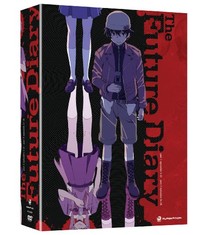Shelf Life
The Flash
by Bamboo Dong,

Nothing this week
Rental Shelf
Future Diary complete series DVD
Princess Knight Part 1 Dubbed DVD
Is This a Zombie? Of the Dead Second Season complete DVD
Perishable
Nothing this week
Welcome to Shelf Life.
 Future Diary is a show that must be watched with all real-world thoughts, logic, and emotion checked at the door. From start to finish, it is held together only with spit, glue, and a thin thread of fabricated plausibility, and in order to enjoy it, you must fully immerse yourself in, and embrace, the universe that Future Diary has created. Otherwise, it completely falls apart. This is especially true of the second season, which starts off as strongly as the end of the first season, but eventually careens, hand-waves, and "gotcha!"s its way into a tumultuous car crash of an ending that is simultaneously thrilling and also utterly bullshit.
Future Diary is a show that must be watched with all real-world thoughts, logic, and emotion checked at the door. From start to finish, it is held together only with spit, glue, and a thin thread of fabricated plausibility, and in order to enjoy it, you must fully immerse yourself in, and embrace, the universe that Future Diary has created. Otherwise, it completely falls apart. This is especially true of the second season, which starts off as strongly as the end of the first season, but eventually careens, hand-waves, and "gotcha!"s its way into a tumultuous car crash of an ending that is simultaneously thrilling and also utterly bullshit.To put the series in perspective—it blows up a school (full of kids, might I add) in the second episode; murders at least two dozen people using gadgets like hammers, knives, and hatchets; and infers the killing of... let's see... five? six? more? people by the hands of family members. There's also a handful of attempted rapes and threats of molestation. By the time the show is a few episodes deep into the second season, it needs more and more ways to increase the shock factor. And so it starts wildly pulling out twist after twist, to the point where it kind of feels like you're playing a board game with a child who insists on continually rewriting the rules of the game. The end result is a show that keeps you on the edge of your seat and keeps you watching, but also claws at your brain, screaming, "What??? What just happened?"
But let's backtrack for a second here. The "future diary" in the title refers to just that—a diary that tells the future. We're introduced first to our primary protagonist Yuki, a loner who spends most of his time playing darts, chatting with his imaginary friend, and logging every detail of his life into his cell phone diary. He wakes up one day and discovers that his diary entry for the day has already been completed—and weirder still, that all the events are coming true. To help catch the audience up to speed, we're given an exposition run-down by a character whose name is literally Deus Ex Machina.
To make a point here, let me just copy and paste what Merriam-Webster has to say about deus ex machina: "a person or thing (as in fiction or drama) that appears or is introduced suddenly and unexpectedly and provides a contrived solution to an apparently insoluble difficulty"
Right, so the god-like character in charge of this future-telling diary (and all of the diaries and their reason for existence) is named for an entity that supplies contrived solutions to near-impossible situations.
It turns out, there are twelve (or thirteen, if you're counting the PSP visual novel) Diary Owners who all have magic diaries that read the future in one form or another. Their task is to use their diaries to kill each other off, and whomever remains inherits all of the godlike powers. All of the diaries are different—Yuki's diary tells him what will happen to him that day. He also has a psychopathic stalker classmate eventually-girlfriend named Yuno, who is not only obsessed with him, but who also has a diary that details all of his future whereabouts and actions. There are also diaries that foretell exit strategies, one that tracks the actions of criminals, one that helps... control dogs, one that grants others their own diaries, and what have you. I mean, there are only twelve diaries (and some apprentice offshoots), but it feels like everyone in Japan has one of these things.
When I originally watched the simulcast of the series, I stopped after the sixteenth episode. The reason was that I just got fed up with how many diaries there were, and how increasingly silly they were. The dog diary was kind of the first fracture, but the Apprentice Diaries (which allows a whole lot of people to have fake, but functional future diaries) was the last straw. Upon rewatching the series for the column, and finally finishing it, I realized that I had no idea of what I had even missed. What I previously thought was nuts going into the seventeeth episode was nothing like the craziness that actually shook down in the last ten episodes. The plot twists are unlike anything I ever could've imagined, and quite frankly, I think the series really spirals out of control. Not so much gore-wise, but in terms of plot contrivances, none of which I feel like I can mention without giving away huge spoilers. To hint, there are two diaries whose omniscient powers basically reduce everyone's diaries, and their tribulations, into child's play.
It must be mentioned that if you're squeamish about bloodshed and rampant murder, this show is absolutely not for you. In fact, it feeds on the shock that it generates from constantly one-upping itself. Every murder gets more and more ridiculous, every kill becomes easier (for both the characters and the viewers), and by the time characters start offing their family members, you can only think, “well, I guess that had to happen.”
It is almost impossible to root for anyone in the series, even primary protagonist Yuki, and especially bunny-boiling Yuno. The two alternately play off each other and use one another in emotionally manipulative ways that makes them both uncomfortable to watch. That the two have the most unhealthy relationship in the universe is an understatement, and it fuels the unstoppable wrecking ball that is Future Diary. Every moment is tenser than the last, not only because you never know who will die next, or what will happen next, but because you never know what your lead characters will do.
At the end of the day, if the question is, “should I watch Future Diary?” my answer is the half cop-out, “at least the first few episodes.” The first half of the first season is, I think, truly wonderful. Yes, it goes without saying that the show is absolutely deplorable and revolting, but the shock alone is powerful enough to keep you going. Each bomb detonation and hammer to the head triggers thoughts of, “I can't believe they did that!” but also, “What will they do next?” It's less a question of what's already been done, than what could possibly be left?
Sadly, I don't think Future Diary really makes it all the way through. The second season falls apart halfway through, sagging under the weight of its frantically-built layers. The story gets written into so many corners that every deus ex machina is more feeble than the one before. The last couple of episodes manage to save themselves, but the ending is abrupt, and it can't seem to pull the series out of the quagmire that suffocates the eight episodes preceding it.
Future Diary is a series that I recommend everyone check out for the spectacle, but I don't think anyone should force themselves to watch beyond what they can handle. It's fun up to a certain point, but the journey up to that point is much better than the payout of finishing.[TOP]
In a completely, utterly mind-breaking change of pace, I decided maybe the best way to cool down from Future Diary would be to pop in TRSI's release of Princess Knight, a 60s cartoon for kids that oozes sincerity in a way that's almost extinct.
 Princess Knight is a fascinating piece of anime history, if not necessarily an important one, or one that's withstood the test of time. The manga from which it was adapted was penned by none other than the great Osamu Tezuka, and published between 1953 and 1956. As far as female heroines go, Princess Knight is remarkable for having one of the first gender-neutralized heroines—lead heroine Princess Sapphire was raised as a boy in order to inherit the throne, and thwart the nefarious intentions of the sinister Duke Duralumon, who continually plots to take over the throne.
Princess Knight is a fascinating piece of anime history, if not necessarily an important one, or one that's withstood the test of time. The manga from which it was adapted was penned by none other than the great Osamu Tezuka, and published between 1953 and 1956. As far as female heroines go, Princess Knight is remarkable for having one of the first gender-neutralized heroines—lead heroine Princess Sapphire was raised as a boy in order to inherit the throne, and thwart the nefarious intentions of the sinister Duke Duralumon, who continually plots to take over the throne. Personality-wise, Princess Sapphire (who's never actually referred to by that name in this 1970s dub) is a rough and tumble tomboy, who's about as courageous and adventure-seeking as any boy. In a way, this is ground-breaking and sets the stage for other notable “strong women who are raised as men, or who prefer to dress as men” characters, like Lady Oscar or Utena. And while in a perfect world, we would have heroines who are heroic for the sake of simply existing, rather than through being defined as boys, but for a series that was penned in the 1950s, this is monumental.
Ideals and sage progressive nods aside, though, Princess Knight is… well, it's a kids show, and not a particularly noteworthy one at that (aside, of course, from the tomboy heroine, which we've already covered). Sapphire is accompanied with your usual cast of sidekicks—her horse Opal, and the irritating (and obnoxiously dubbed) Choppy (who was named Tink in the original Japanese version), an angel who was sent down to Earth by God to fix his mistake of accidentally giving Sapphire the heart of a boy. In the dub, Choppy sounds not unlike a drunkard's impersonation of Mickey Mouse, punctuating sentences with a feeble “ohhhh!” and other faint exclamations. In fact, just about every character has some kind of vocal affectation, although in the 70s, I'm not sure any other type of voice acting existed.
Broadly put, Princess Knight is one of those standard, made-for-kids fares where every episode is packed with some kind of moral lesson (don't hit animals, don't pick on the weak, don't steal, help your friends, don't be an a-hole) and padded with a spirited sense of adventure. Animals talk, magical things happen, bad guys are just kind of sort of bad, without ever truly being evil. At its worst, the show maybe hits a PG rating, but largely hovers around a G. It's an automatic babysitter kind of show. For kids nowadays, it might even be too tame, although the magic number is probably somewhere between 5-6 years of age. It certainly hasn't aged well, neither humor-wise (which largely involves slapstick) nor animation-wise (which represents the limited animation of its time). I certainly had a difficult time keeping a straight face through any of the episodes. There were moments that were downright laughable, especially when a villain would croon, “Come back heeeeeeeeere,” even though neither he nor the heroes were moving any further apart from each other.
I certainly wouldn't discourage anyone from purchasing Princess Knight, especially as a historical keepsake, but I would find it hard to believe that anyone over the age of six could sit down and watch the entire thing. This first part includes 26 episodes, and already it's a Herculean task to sit through all of them, much less the entire series. Perhaps if one was a scholar of classic animation, Princess Knight would be a good acquisition. It's one of those series—good for what it represents, but less so as a product intended for consumption.[TOP]
On a scale of 1-10, with 1 being "not jarring at all," and 10 being "jarring as F---," the transition between Princess Knight back into the world of weird with Is This a Zombie? of the Dead was maybe at an 8. It probably would've been more jarring jumping to Future Diary.
 Sequels are a tricky thing. I say that not from a production standpoint, obviously, but just as a casual observer, who's seen many a sequel flounder and flop. Is This a Zombie? of the Dead neither flounders nor flops, but it does struggle a bit. Mostly, it's because it's nothing like the first series, yet can't avoid the comparisons.
Sequels are a tricky thing. I say that not from a production standpoint, obviously, but just as a casual observer, who's seen many a sequel flounder and flop. Is This a Zombie? of the Dead neither flounders nor flops, but it does struggle a bit. Mostly, it's because it's nothing like the first series, yet can't avoid the comparisons. By far, the best set of episodes are the first several, which chuck a cohesive story arc out the window in favor of an extended gag (which, to be fair, is hilarious). Like many times in the past, our beloved cross-dressing magical girl zombie hero Ayumu encounters a Megalo, and is forced to transform into a Magical Garment Girl to defeat it. Except this time, he isn't able to erase everyone's memories, and he because notorious as an ass-exposing, perverted weirdo. The next several episodes deal with the aftermath of this incident, with some characters becoming increasingly obsessed with his ass, while others try to cure him of his supposed fetish. There are some tender moments mixed in, but for the most part, it's laugh after laugh, with only the slightest whisper of a story arc.
When a story does kick in at the end, it's kind of meh. We learn some things about Chris, Ayumu's teacher, and it turns out she has a bit of a strange past involving Magical Garment Girls. In fact, we actually get to spend a fair amount of one-on-one time with many of the characters in this season of Is This a Zombie? of the Dead, but considering that character development has never really been this series' strong suit, it's not particularly revelatory. One appreciates that the series makes an effort to work on the relationship between Ayumu and each girl, but at times, the attempts almost feel passe.
Obviously, the voice cast has been carried over from the first season, and they continue to handle their roles well. I love Austin Tindle as Ayumu, who's given extra liberties in this season to be as kooky and sarcastic as possible. He lends just enough flexibility to cover both his character's wilder moments, as well as the quieter interactions with his bevvy of ladies.
For fans of the first series, I think the sequel certainly hits the right spot several times. The first few episodes are weird and hilarious, even though they meander a bit. It's as if it just took the humor from the first series and just distilled it into a brick of episodes. For those fans who just want to see their favorite characters again, I guess it works. The series tries awfully hard to wring out some meaningful interactions between Ayumu and his gals, and while it doesn't always work, it's appreciated. For fans of the first series, they will inevitably derive some enjoyment out of this season, although I'm not sure it fully lives up to its predecessor.[TOP]
Okay, that's it for this time. See you again in two weeks for another Shelf Life!

This week's shelves are from Samantha, who wrote the following about her collection:
"I've been collecting manga since 7th grade and this is the end result. some aren't pictured because I haven't added them to the shelf yet or I dont have them anymore. My DVD collection is pretty pathetic by comparison but that's because I tend to be more selective about what I purchase because they're a little pricier!"


Aww, it's not pathetic at all! Plus that is an enviable manga collection!
discuss this in the forum (30 posts) |
this article has been modified since it was originally posted; see change history